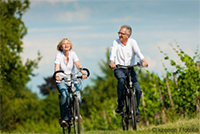Conquering your inner couch potato

All around the world, people get too little exercise. In Germany, not even one in two is active enough, and the number keeps falling. A sports doctor explains what the minimum amount of exercise should be, and when you'll feel the first beneficial effects.
A recent study by the World Health Organization (WHO) shows that almost every third person worldwide doesn't get enough exercise. In Germany, the situation is even more dramatic. Just four out of ten people are active enough, a 2018 report from German Health Insurance (DKV) shows. "This is a sad new low in a years-long trend," says Prof. Dr. Peter Deibert, Medical Director of the Institute for Exercise and Occupational Medicine at the Medical Center - University of Freiburg. Only eight years ago, at least 60 percent of people were sufficiently active.
Lack of exercise increases the risk of cardiovascular disease, type 2 diabetes, dementia and some cancers. "The positive effects of exercise and movement are undisputed, and almost everyone is capable of getting sufficient exercise," says Prof. Deibert.
The WHO recommends at least 75 minutes per week of exercise intense enough to make you sweat, or at least 150 minutes of moderate exercise. Long distance swimming, dancing and running are just a few examples of how you can really get winded. Even for lesser exercise sessions starting at 15 minutes a day, the positive effects are now proven.
In addition to endurance training, it's important to move around regularly in daily life. This also holds for on the way to work - people who go by bike have a lower mortality risk.
Three times a week
"It's important that you stay at it continuously," stresses Prof. Deibert. Those who exercise just twice a week will be able to improve their performance only very slowly, if at all. It should be three times a week. And there should not be too many days in-between, so that the next exercise session is stimulated by "activated" muscles.
In preparation, a small snack is recommended: "A light meal before exercise makes sense if you're walking more than half an hour. Otherwise it can lead to reduced performance. The legs become heavy, one gets tired, and it can make you dizzy," says the Medical Center - University of Freiburg sports doctor.
First effects after four to six weeks
After about four to six weeks, a routine will set in for exercise novices. The body knows that it will be challenged regularly, and your stamina will also improve. Climbing stairs is easier, you don't run out of breath so quickly, and it just so happens that some of your "padding" melts away.
Check-ups for the inexperienced over 40
Those over the age of 40 who want to exercise regularly again, and have not been checked by their doctor in the past few years, should definitely talk to him or her first. "For older sports enthusiasts, Nordic walking is a very good beginner's exercise," says Prof. Deibert.
Back